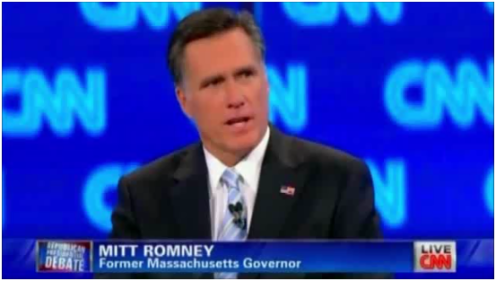Romney Forgets his ABCs
Last night’s CNN Republican debate in Arizona (dubbed by some “The Mudfight in Mesa”) ended with one final question put to each of the candidates, “What is the biggest misconception about you in the public debate?” Similar to the classic job interview question, “What’s your greatest weakness?” the question is designed to force a candidate to acknowledge a negative trait while offering the amusement of watching someone turn that same weakness into a strength (“People say I’m a perfectionist…”).
For these four extensively trained media spokesmen however it’s an opportunity to employ the ABC’s of media training. As the acronym indicates, ABC is one of the most basic lessons taught by public relations pros to spokespeople. When asked a question that looks like it will take you off message Acknowledge it, Bridge back to your message, and regain Control of the conversation.
Coming at the close of what might be the final Republican debate before a key series of primaries, John King, the CNN moderator, could have asked, “So, in summary, what makes you the most qualified to be the next president of the United Sates?” In fact, it doesn’t matter whether John King asked this question or not, this was the question the candidates needed to answer. It was their opportunity to summarize what makes them the voters’ best choice.
So how did the candidates do? Ron Paul answered that the biggest misconception about him was that he couldn’t win, ignoring the ABC’s and answering the question posed. In Paul’s case this is a fine answer because it reinforces his image as no-nonsense straight shooter (and because he indeed can’t win). Rick Santorum replied similarly but deftly applied the ABC’s and bridged to his talking points as the only true conservative choice. Newt Gingrich applied the ABC’s without answering the question by stressing “the one thing” that he wanted voters to know about him was the amount of work it took for him to achieve his many accomplishments. This wasn’t an acknowledgement of any public misconception, but it kind of sounded like it and was a logical enough bridge that the audience (and the moderator) went along with it.
Mitt Romney, on the other hand, neither minded his ABCs like Santorum and Gingrich nor answered the question like Paul. Instead he skipped the A and B and went straight to the C in an attempt to summarize why he would make the best president. It was so jarring that the moderator attempted to bring him back to the question about perceived misconceptions, to which Romney replied, “You know, you get to ask the questions you want, I get to give the answers I want.”
Some commentators hailed Romney for not allowing himself to be bullied. Others admonished him for avoiding the question. But the real issue is that in forgetting his ABCs, Romney let the question get all the attention when it’s the answer that really matters.
————————————————————————
JOHN KING, CNN: Governor Romney?
MITT ROMNEY: We’ve got to restore America’s promise in this country, where people know that with hard work and education that they’re going to be secure and prosperous and that their kids will have a brighter future than they’ve had. For that to happen we’re going to have to have dramatic fundamental change in Washington, D.C. We’re going to have to create more jobs, have less debt, and shrink the size of government. I’m the only person in this race…
KING: Is there a misconception about you? The question is the misconception.
ROMNEY: You know, you get to ask the questions you want, I get to give the answers I want.
KING: Fair enough.

What a great and different way to analyze the candidates and their responses. Very insightful. And funny.
Great post! Very informative from the start, and proves your point. Romney made the mistake of proving the ‘misconceptions’ about him.
Perhaps Romney’s staff was a bit too hasty in firing his new media coach? (February 3, Romney Splits with Debate Adviser http://tinyurl.com/7wornzv).